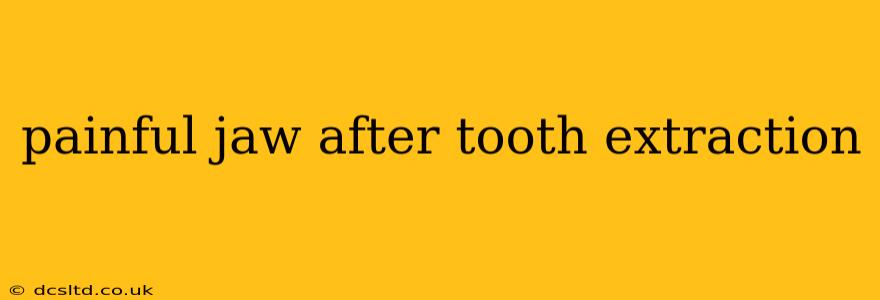Having a painful jaw after a tooth extraction is a common experience, but it shouldn't be dismissed. While some discomfort is expected, persistent or severe pain warrants attention. This comprehensive guide will explore the causes of jaw pain post-extraction, effective treatment options, and preventative measures to minimize discomfort.
What Causes Jaw Pain After Tooth Extraction?
Jaw pain following a tooth extraction stems from several factors, often intertwined:
-
Inflammation: The extraction site naturally inflames as part of the healing process. This inflammation can radiate to the surrounding jawbone and muscles, causing pain and stiffness.
-
Dry Socket: A dreaded complication, dry socket (alveolar osteitis) occurs when the blood clot protecting the extraction site dislodges or dissolves prematurely. This exposes the underlying bone and nerves, leading to intense, throbbing pain that often radiates to the jaw.
-
Infection: Bacterial infection can occur if the extraction site isn't properly cleaned or if bacteria enter during the healing process. This can manifest as severe pain, swelling, and pus.
-
Referred Pain: Pain originating from the extraction site can be felt in other areas, including the jaw, ear, and temple. This referred pain is common and often misdiagnosed.
-
Muscle Tension: The surgical procedure itself, along with any post-operative swelling and discomfort, can cause you to tense the jaw muscles, exacerbating pain.
-
Sinus Issues: Extractions in the upper jaw can sometimes affect the maxillary sinus, leading to sinus pain that might feel like jaw pain.
How Long Does Jaw Pain After Tooth Extraction Last?
The duration of jaw pain varies significantly, depending on the complexity of the extraction, individual healing rates, and the presence of complications. Mild discomfort typically subsides within a week, while more intense pain or complications can last longer. Consult your dentist or oral surgeon if pain persists beyond a week or worsens.
How to Treat Jaw Pain After Tooth Extraction?
Treatment depends on the cause of the pain:
-
Over-the-counter pain relievers: Ibuprofen or acetaminophen can effectively manage mild to moderate pain. Always follow the dosage instructions.
-
Prescription pain medication: Your dentist might prescribe stronger pain relievers if over-the-counter options aren't sufficient.
-
Rinsing: Gently rinsing your mouth with salt water can help clean the extraction site and reduce inflammation.
-
Cold compresses: Applying cold compresses to the affected area can reduce swelling and pain.
-
Rest: Resting and avoiding strenuous activities will allow your body to focus on healing.
What if I have a Dry Socket?
Dry socket requires immediate attention from your dentist. They will likely clean the socket and pack it with medication to promote healing and relieve pain. This is a serious complication that needs professional care.
How Can I Prevent Jaw Pain After Tooth Extraction?
Several steps can minimize the risk of post-extraction jaw pain:
-
Follow your dentist's instructions carefully: This includes medication regimen, post-operative care, and activity restrictions.
-
Maintain good oral hygiene: Brush and floss gently, avoiding the extraction site.
-
Eat soft foods: Avoid chewing on the affected side to prevent dislodging the blood clot.
-
Avoid smoking: Smoking significantly increases the risk of dry socket and impedes healing.
-
Avoid using straws: The sucking action can dislodge the blood clot.
-
Stay well-hydrated: Adequate hydration supports the body's healing process.
Can Jaw Pain After Tooth Extraction Be a Sign of Something Serious?
While most jaw pain after tooth extraction is manageable and resolves quickly, persistent, severe pain, accompanied by fever, swelling, or pus, could indicate a serious complication like infection. Seek immediate dental care if you experience these symptoms.
This information is for general knowledge and does not constitute medical advice. Always consult with a qualified dental professional for diagnosis and treatment of any dental condition. Your dentist can assess your specific situation and provide personalized recommendations.
